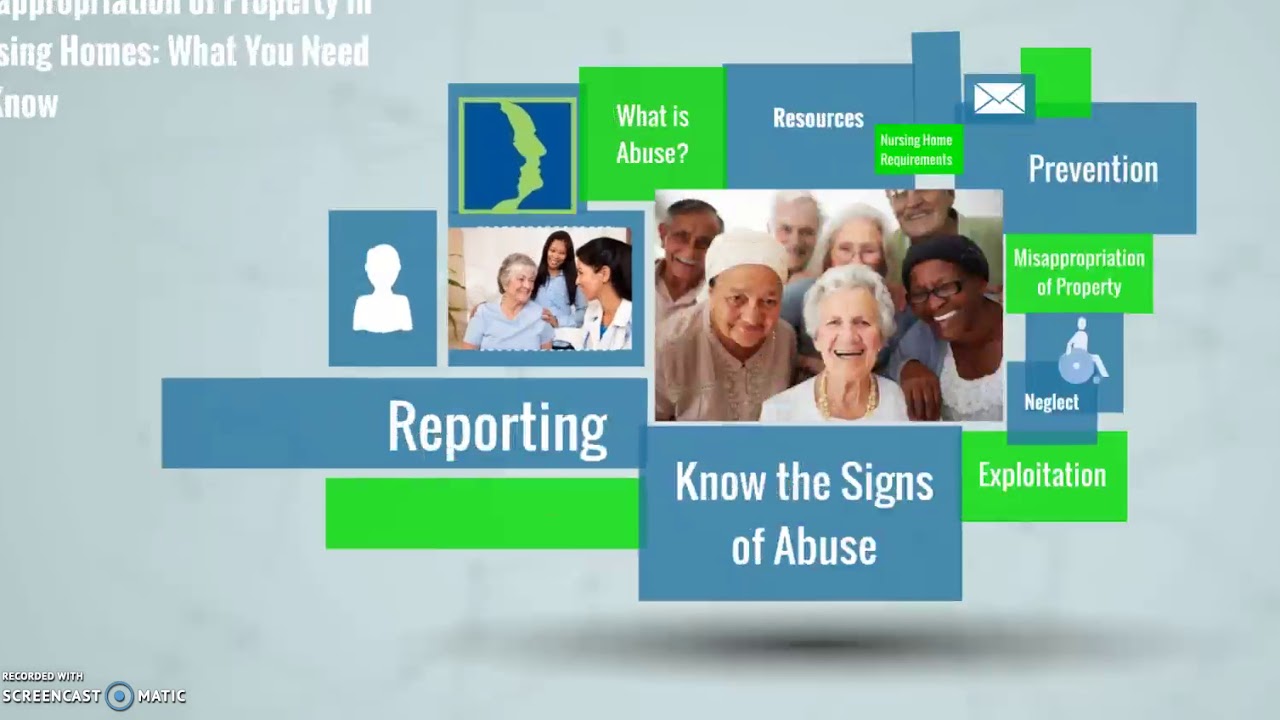Consumer Voice’s Policy Principles and Recommendations
Learning & Resources
Consumer Voice provides information on a variety of long-term care topics including issues consumers may face and public policy that affects consumers.
Priority Issues
All Long-Term Care Topics
Abuse, Neglect, & Exploitation
Despite the fact that nursing home residents have a federally protected right to be free from abuse, it is estimated that 1 in 10 older adults experience some form of abuse or neglect. Abuse and neglect can come in many forms including sexual abuse, financial exploitation, privacy issues, resident-to-resident mistreatment, and issues related to surveillance/electronic monitoring.
Arbitration
Arbitration Clauses in Long-Term Care Facility Admission Contracts
Arbitration agreements take away your right to hold your nursing home accountable in court, for any and all potential negligence or wrongdoing. Residents, when entering a nursing home, may be presented with a pre-dispute arbitration agreement. You have the right to refuse to sign.
Bed Rails
Protecting Long-Term Care Consumers from the Dangers of Bed Rails
Bed rails are metal or plastic bars positioned along the side of a bed, also commonly known as side rails. Bed rails are frequently used in homes or long-term care facilities because they are believed to keep people safe. In reality, bed rails can be extremely harmful and considered a physical restraint.

Dementia Care without Drugs (Antipsychotics)
Too many residents, particularly those living with dementia, are being given off-label antipsychotic drugs to control their behavior instead of person-centered care that meets their individual needs. These drugs can have serious, life threatening side effects for older people. Antipsychotic drugs are meant to treat patients with specific mental disorder diagnoses such as Schizophrenia. These drugs are not appropriate treatment for dementia. When used for sedation, these drugs are a form of chemical restraint. You have the right to question the use of these drugs and raise concerns.

Equity in Care
Studies show disparities exist in access and quality of health services for racial and ethnic minorities, individuals who identify as LGBTQ+, and others. These disparities persist for individuals seeking long-term care services.

Electronic Monitoring Devices (Surveillance Cameras)
Long-term care residents or their family members might consider installing a surveillance camera in a resident’s room to help determine that the resident is receiving appropriate care and being treated with dignity and respect, or to be a deterrent to abuse. While surveillance cameras and other devices can offer information about the type of care provided and how a resident is being treated by nursing home staff, other residents, and visitors, they can be invasive and may violate the resident’s or their roommate’s right to privacy.
Emergency Preparedness

A nursing home, assisted living, or other long-term care facility should have a comprehensive emergency plan in place, so that residents can be protected and supported in times of crisis. A nursing home, by federal law, is required to have evacuation plans in the event of a natural or man-made disaster.
Resources from CMS
- Emergency Preparedness Requirements for Medicare and Medicaid Participating Providers and Suppliers
- CMS Emergency Preparedness Rule
- CMS Emergency Preparedness Rule: Resources at Your Fingertips
- Emergency Preparedness for Every Emergency
Checklists for:
Home and Community-Based Services
Many older adults want to age in place – to receive
 necessary services without moving into a nursing facility or other health care institution. The Medicaid program provides this type of assistance through home and community-based services (HCBS) programs. These programs are designed to help people remain in their communities.
necessary services without moving into a nursing facility or other health care institution. The Medicaid program provides this type of assistance through home and community-based services (HCBS) programs. These programs are designed to help people remain in their communities.
Resources about the HCBS Rule
Consumer Resources
-
- Consumer to Consumer: Tips for a Successful Nursing Home Transition (Large Print)
- Steps to Getting Quality Home Care from an Agency or from a Home Care Worker You Hired
- How to Address Concerns with a Home Health or Home Care Agency or with the Home Care Worker You Hired
- What is Quality Home Care?
Infection Prevention (Flu, Cold, & COVID-19)
Individuals in long-term care settings are especially vulnerable to viruses, infections, and other health issues. These infections can have negative emotional, financial, and medical effects on long-term care residents. Our resources include a wide range of information on flu prevention, best practices around COVID-19, and healthcare-associated infections such as catheter-associated urinary tract infections.

Long-Term Care Ombudsman Program
The Long-Term Care Ombudsman program (LTCOP) advocates for individuals residing in nursing facilities and residential care communities, such as assisted living facilities and board and care homes. They resolve problems that impact residents’ rights, quality of life, and quality of care, and work to improve policies at the local, state, and national levels.

Medicaid
Medicaid is the primary source of payment for long-term care in this country. Medicaid covers long-term services and supports for roughly 9.3 million older adults and people with disabilities, with roughly 700,000 of those people living in nursing homes.

Mental Health & Mental Illness
Individuals receiving long-term care may experience challenges and adjustments regarding their mental health. Good mental health enables a person to face changes to their environment and daily routine and adapt to them.
- Taking Care of You: Tips for Residents of Long-Term Care Facilities
- Taking Care of You: Tips for the Family Caregiver
- Working With Individuals With Mental Health Conditions – Reference Guide for Long-Term Care Ombudsman Programs
Nursing Home Closures
Nursing home closings can have serious negative effects on residents. When closures are inevitable, better policies and practices can be implemented to minimize the negative impact, including transfer trauma, on residents.

Personal Needs Allowance (PNA)
A Personal Needs Allowance (PNA) is a monthly sum of money that nursing home residents, who receive Medicaid, may retain from their personal income. Any income above the allowance is applied toward the cost of their care.

Retaliation
Retaliation, and the fear of retaliation, can prevent residents and family members from raising their concerns about care and safety. It also has a chilling effect on the reporting of abuse or neglect in long-term care facilities, leaving many living in fear and without relief from harm.
Advocacy in Long-Term Care: Addressing Concerns about Retaliation – Fact Sheet

Residents’ Rights
Residents’ Rights are guaranteed by the federal 1987 Nursing Home Reform Law. The law requires nursing homes to “promote and protect the rights of each resident” and places a strong emphasis on individual dignity and self-determination. Nursing homes must meet federal residents’ rights requirements if they participate in Medicare or Medicaid. Some states have residents’ rights in state law or regulation for nursing homes, licensed assisted living, adult care homes, and other board and care facilities.
Staffing
Chronic understaffing has been a serious problem in nursing homes for decades and has been exacerbated by the COVID-19 pandemic. While there are numerous factors contributing to this problem, one major cause has been the lack of adequate minimum staffing standards at both the state and federal levels. Minimum standards ensure that staffing will not fall to a level that would be harmful to residents.

Transfer and Discharge
The threat of transfer or discharge from a nursing home can be both frightening and stressful for residents and their families. Too often, a facility may respond to a resident’s difficulties or increasing need for care, or repeated questions or complaints from family members, by attempting to transfer or discharge a resident. Residents have rights regarding transfer and discharge.
Transparency & Accountability
Each year nursing homes funnel billions of dollars through private equity firms and related party companies (companies they own) with little to no oversight by the Centers for Medicare & Medicaid Services (CMS). Increased transparency and oversight of nursing home finances and ownership is critical to protecting both resident care and the integrity of public reimbursement.

Trauma-Informed Care
Trauma-informed care involves understanding, recognizing, and responding to the effects of all types of trauma. Trauma-informed care also emphasizes physical, psychological, and emotional safety for both consumers and providers, and helps survivors rebuild a sense of control and empowerment. It’s essential that long-term care consumers receive culturally competent, trauma-informed care. A person’s experience of an event determines whether it is traumatic and everyone’s experience is unique. This means it is important that every resident has a comprehensive assessment and individualized care plan.
Trauma-Informed Care: Nursing Home Requirements and Ombudsman Program Advocacy – Reference Guide for Long-Term Care Ombudsman Programs

Voting
Individuals receiving long-term services and supports retain their voting rights, no matter where they live or what type of care they receive. However, residents of long-term care facilities may have a harder time voting due to mobility, health, and other issues that inhibit their access.

Didn't find what you need?
Become a Member
Want more in-depth information? Join a community of passionate, like-minded advocates and get exclusive access to experts and resources.














